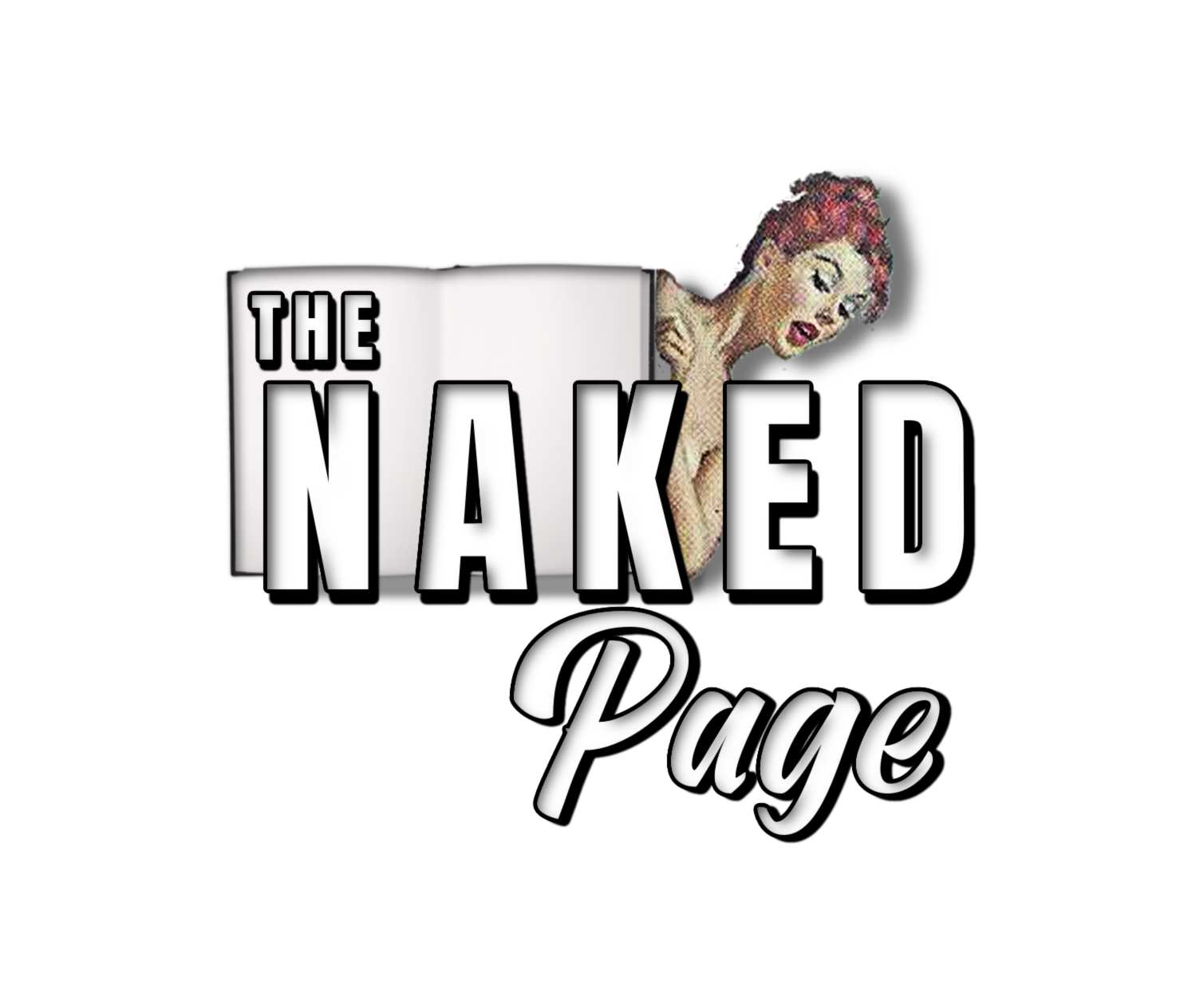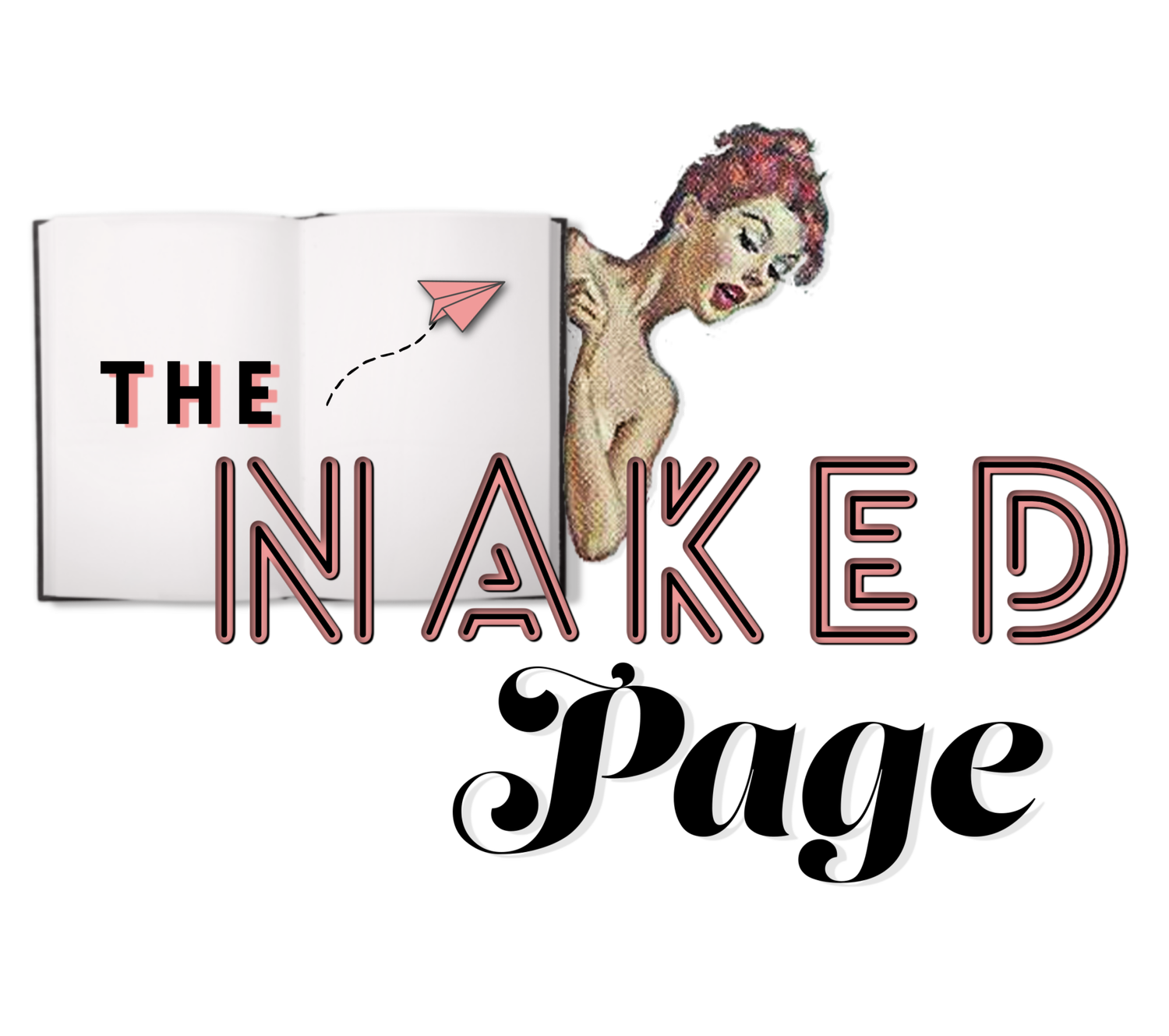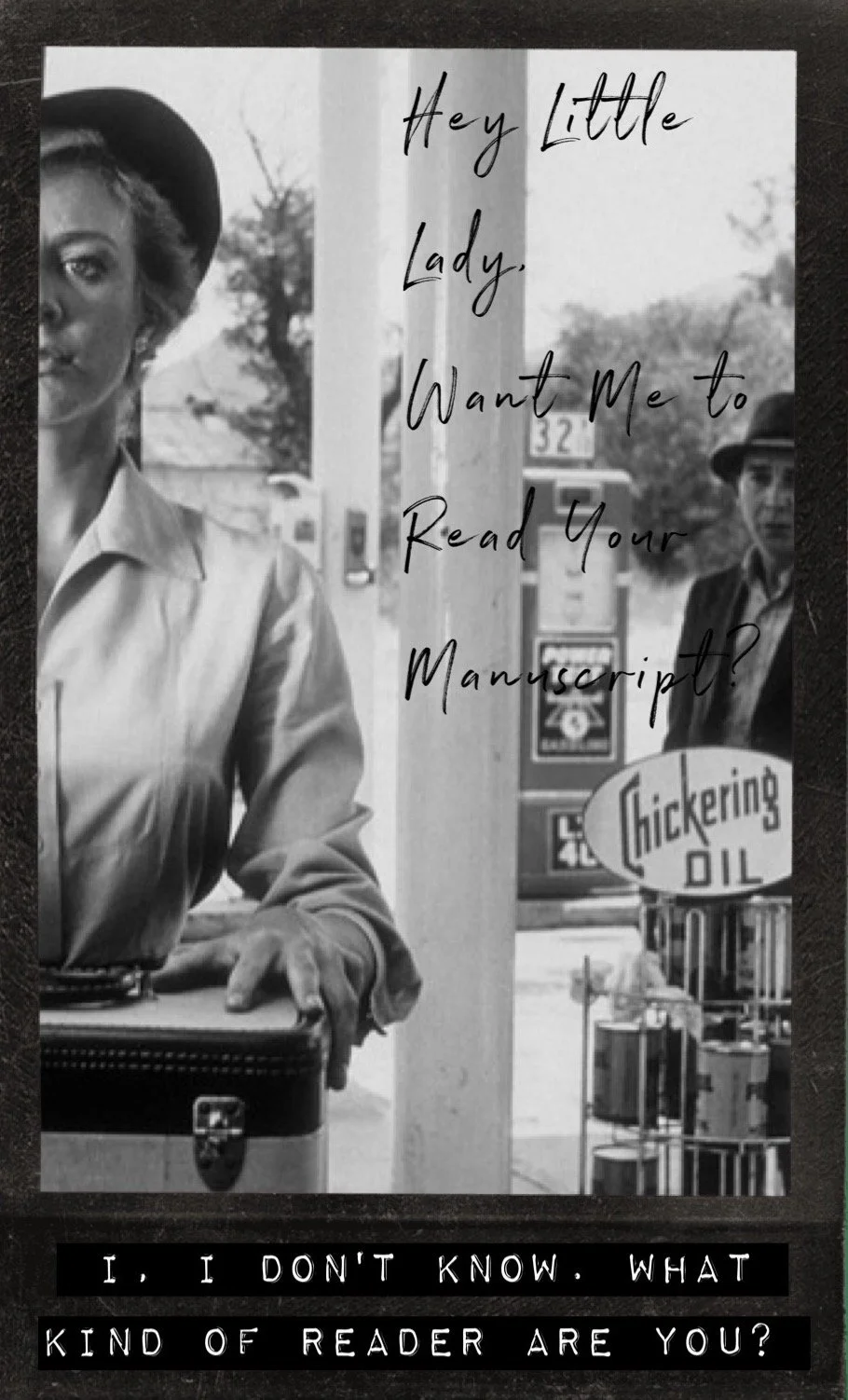Who’s Your Best Reader?
Who should read your writing first?
Only your ideal reader, right?
Wrong answer.
Your ideal reader plays a huge role in the construction of your story.
But guess what?
If you plan to put that story out on the market, you’re gonna have a lot of eyes on your work before that ideal reader ever shows up.
I mapped out all the different people who will potentially see your writing from rough draft to published manuscript. It blew my mind.
This list reminds me of having a baby:
“Awwww… we’re pregnant! Such a bonding experience for the two of us—me and my guy!”
Until...
You realize how many people are going to see you naked and be all up in your hoo-ha.
“Book birthing is as messy, disgusting, and complicated as birthing a real baby.”
There’s the ultrasound tech, the OB and/or the midwives, the doulas, and if your fantasy bubble pops and you don’t get to stay at the birthing center like you planned… weeeelllll, then you get a whole host of hospital doctors, nurses, and anesthesiologists who change shifts every 12 hours. And they’ll all poke and prod at your lady parts.
“Can we get Doc Avatar Fingers in here?”
A nurse screamed this request from my hospital room when I was in labor and they needed to check my cervix.
TMI? Get used to it.
Book birthing is as messy, disgusting, and complicated as birthing a real baby. It requires many people to pull your best story out of you.
“A whole slew of people will need to inspect your narrative. ”
I’m floored by the number of people who think they’ll write a rough draft painlessly, hand over their manuscript to a proofreader, and presto change-o, it’s time to push print.
Nopity, nope nope.
Not even if you get Doc Avatar Fingers doing your editing!
Just get the facts straight.
If you stick to therapeutic writing, you’re the only person who will ever look at your work.
But the minute you churn out a rough draft and decide, “Hey, I gotta get this baby on the market,” then a whole slew of people will need to inspect your narrative.
I put together a rough list of people who will potentially manhandle your book before it’s ready for its close-up.
Here’s the general overview:
Before Publishing
You
Friends & Family (maybe)
A Teacher (if you’re in a writing class)
Beta Readers
Writing Group Members
A Writing Coach
Hired Editors
Hired Proofreaders
During Publishing
Literary Agents
Publishers
A Team of Editors (developmental, line editors, copy editors, proofreaders)
A Legal Team
A Creative Team of Designers (for things like your book cover)
Sales Department
Marketing, PR, and Advertising Teams
After Publishing
An Unintended Audience
People who hate you for no reason whatsoever but will let you know in your Facebook comments
And finally—Your Ideal Reader
That’s a lot of people staring at your book baby. And they’re not just reading it. They’re noodling with it, sticking their fingers in your perfect creation.
“As soon as you entrust someone else to read your work, be ready for them to take your story apart.”
How can you prepare yourself for all these muddy boots stomping across your clean white page of a manuscript?
Realize that if you’re writing a memoir, you need to process—mentally, emotionally, and spiritually—as much of your stuff as you can. As soon as you entrust someone else to read your work, be ready for them to take your story apart. It can feel invasive for someone to slice and dice your traumatic past, so it’s important to have some support.
The first time I got published—and we’re talking a dinky small piece—I was a wreck. I had naked nightmares for weeks. So, I started working through my writing process by sharing my stories in a writing group. In time, sharing stopped re-traumatizing me and I felt more comfortable putting my work in front of an audience.
If you go the route of a traditional publisher, you’ll have to be prepared for whole teams of people reviewing your writing.
But what about before you consider getting published or even self-publishing?
What happens in the space where you’ve completed a manuscript but worry about how your book’s message will connect to an audience?
There are several people you might enlist to be first readers. Let’s get to know them.
You
I know you know you. Of course, you’re reading your own writing.
But how are you reading it?
Have you developed the skills to read your writing as if you were someone else? It’s very meta, but this is a skill you can learn.
Kurt Daw, my old university theatre dean wrote a book called Acting: Thought into Action. Using Stanislavski’s method, Daw describes something called the Spheres of Attention for the actor. First, there’s the smallest sphere around you as a character in a made-up world. Then that sphere opens to a bigger sphere that includes how your character relates to the other characters on stage. The sphere widens and eventually includes the audience.
Spheres of Attention answers the question: how can you be fully in character, but not fall off the damn stage?
To do this, Daw explains that an actor’s brain must learn to double track.
Your brain knows you are both the character and the actor at the same time. You give the illusion that you’re having the character’s experience, while you ensure that you are also responding to an audience with your timing and your ability to project and be seen.
Writers need to learn how to double track their stories.
You have to write from your perspective while remaining aware of how an audience will interpret your story. Each reader will bring their personal experiences to your material.
Consider setting your work aside. When you return, try reading it through a different lens.
Read your work:
At different times of the day
After you’ve had a glass of wine
When you’re in different moods
While you are traveling, at work, or on vacation
With a little training, you can be your own best reader.
Friends & Family
The cheapest and quickest way to get feedback for your writing is to enlist close friends or family to read your material. But DANGER! DANGER WILL ROBINSON! (do I sound really old when I do that? Too much Nick at Night from my childhood.)
I let my father read a few pieces of my early stories, but I stopped. My father is no stranger to the writing process. He’s a PR guy who’s worked in the newspaper business and edited for published authors. He’s a terrific reader. But he’s also my parent. That overlap between personal and professional boundaries can get blurred.
I no longer let any family read my work, because when I do, my writing sounds like it’s asking for permission. Permission is a shitty writer’s voice.
However, my husband reads everything I write. We were submissions editors together for a literary magazine. Oh, those steamy literary arguments! (Don’t be jealous. We've got a toddler now. The jig is up!)
But what if your significant other is an accountant or a bricklayer?
No worries. Chances are, family members aren’t the best readers of your work, anyway. They may be so eager to give you positive feedback that you never learn how you can improve your writing. Or they could be so envious of your talent that they lambast your work!
It's hard to get distance from people who are up close & personal.
Teachers
Maybe you started in a creative writing class and that’s where the author bug bit you. Classes and teachers can provide essential writing skills.
But remember, not all teachers’ guidance is golden. Just because a teacher doesn’t like what you’ve written, doesn’t mean you aren’t fit to become an author.
On the flip side, tons of red ink doesn’t necessarily mean your manuscript’s shit.
I gave heavy feedback to my students. Much of it was in praise of the writing. Some of it was to show the student that their good story could be tightened up to become a great story. Not all red marks are equal in the field of writing.
If you want to be a real writer, you’ll need to get used to seeing editing marks on your work. Just know teachers are human and have personal preferences.
Don’t hang your hat on one teacher’s opinion.
Beta Readers
This is a great resource for the early edits of your book, but you need to find the right kind of beta reader. I’ve got a short eBook coming out called How to Train Your Beta Reader.
Until the eBook is ready, let me say, by far the best beta reader I ever had was a good friend from high school.
She’s not a writer. But she loves to read.
Why does this matter?
Beta readers who are also writers can impose their style on your stories. It isn’t that they don’t have a knack for reading. But if they are writers also looking to get their stories on the market, they may want to rewrite your work.
With beta readers, you’re not looking for a writer or an editor.
Find someone who loves stories. A person who will point out what moves them about your work. But someone who isn’t afraid to ask questions when they get confused. This is the closest you’ll get to an ideal reader before publishing.
The key to finding a good beta reader is selecting someone who can be an active reader. A person who will engage with the text. Someone who can give meaningful criticism without ripping your work to shreds.
If you know a ravenous reader, they might be the perfect person to have a first look at your manuscript.
Writing Group Members
Behold the group! Gather.
A bunch of writers sitting in a room together. This can be intimidating, right? Don't let it feel that way.
Critique groups come in all shapes and sizes. And like a good 12-step meeting, you've got to find one that fits you. I spent years as an assistant to Rosemary Daniel, creator of Zona Rosa, one of the longest-running critique groups for women in the country. She's been at it for 38 years, so her methods for giving constructive criticism are top-notch.
I brought my first assignment for an online travel writing course to a Zona Rosa workshop. After I made revisions based on the group’s suggestions, I submitted it.
That first assignment was published for pay.
But not all writing groups will give you effective feedback. A critique group can be a double-edged sword. I have a love/hate relationship with them.
Most writing groups are filled with people who don't have any more experience than you do. Some of these groups can be supportive, but others can level some pretty harsh criticisms. Still, other groups may provide you with writing suggestions that are anchored to opinion rather than good story structure.
Don't get me wrong. A critique group can be your best bet at getting your writing reviewed. But you must find a writing group that advances your storytelling skills. They don't all communicate with grace or tact. While some feel more like a social club than a critique group.
Think about auditioning a few groups. Look for workshops that are led by writing coaches or editors with experience. Speaking of…
Writing Coaches
Hey! Hey there.
No, I’m not flirting or plugging myself right now.
I’m pointing out that this is my area of expertise.
Hiring a writing coach is an option, especially for people who feel overwhelmed by the process. A good writing coach will not only suggest ways to improve your writing but will also understand the emotional toll writing can take.
I won’t lie. I’ve sent a lot of people into therapy as a writing coach, including myself.
90% of my male clients write fiction. Their biggest fear is not getting published.
90% of my female clients write memoir. They worry about being too seen.
Guiding someone through the storytelling process can be a bit like going into counseling. You’ll be traveling into some dark places. These places will produce the most compelling storytelling, but you’ll need support during the process. It’s never enough to just red-mark someone’s story and a writing coach understands this.
If you’re a writer, you may need support structures in place to deal with failure, success, and the exposure of putting yourself on the page. A writing coach might be your best bet.
Hired Editors
Hey there, again!
Yes, I’m also a developmental editor.
A developmental editor will help guide the direction of your story. But there are other types of editors. Many overlap but call themselves by different names like line editors, substantive editors, style editors, and copy editors.
It’s important to know what kind of editor you’re working with. A copy editor won’t coach you through the development of your story.
Ask potential editors to describe their process:
Are they looking for issues at the sentence level, the paragraph level, or with the overall story?
Will they edit your work in Google Docs, a Word Doc, or by hand?
Will they provide a summary of feedback with suggestions for revisions or will they only red-mark your manuscript?
Will you get a Zoom call or meet in person, so you can discuss your next steps?
How many revisions will they provide? Getting feedback one time may not be enough.
Know the kind of editor and their editing process before you hire someone.
Hired Proofreaders
Editors often get mixed up with proofreaders.
Some editors do both.
When we speak of proofreaders, we’re talking about spelling, grammar, and typos ONLY.
This isn’t someone who will take your story apart and put it back together again. And they certainly won’t support you emotionally through your story’s development.
The proofreader is the last step. It’s never a good idea to find a beta reader who thinks they’re supposed to proofread your manuscript. You’ll get stuck with an insensitive grammar cop. More on this in How to Train Your Beta Reader coming soon.
“These are the people in your reading neighborhood.”
Who might be your best source of support for your writing process right now?


